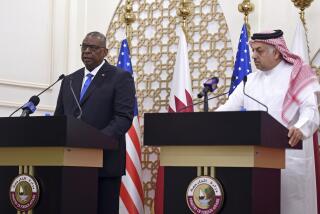Commander of U.S. forces in Afghanistan warns of greater casualties
- Share via
WASHINGTON — President Obama’s pick to lead U.S. forces in Afghanistan warned Tuesday that casualties are likely to increase as the military steps up its campaign against insurgents.
Lt. Gen. Stanley McChrystal also voiced skepticism that Taliban guerrillas could be persuaded to sever their ties with Al Qaeda; a similar strategy was crucial in McChrystal’s success as commander of special operations forces in Iraq.
“I don’t think that the Taliban have any reason right now to turn their back on Al Qaeda,” McChrystal said in testimony before the Senate Armed Services Committee, his first public remarks since being selected last month to lead an overhauled U.S. strategy in Afghanistan.
One reason is that the Taliban is widely perceived in the region as prevailing against coalition forces. He also cited intermarriage among Al Qaeda members and Taliban-connected tribes along the border with Pakistan. “They’ve created connections that are beyond just organizational,” he said.
McChrystal, director of the Pentagon’s Joint Staff, is expected to make sweeping changes in the U.S. approach to a war effort that has suffered setbacks since the rout of the Taliban government in 2001.
President Obama has ordered an additional 21,000 U.S. troops to Afghanistan, and Defense Secretary Robert M. Gates last month fired the U.S. commander there, Gen. David D. McKiernan, to bring “fresh thinking” to the battle.
McChrystal said his strategy will rely heavily on bolstering U.S. intelligence collection, reducing civilian casualties and dramatically speeding up the training of Afghan security forces.
The Obama administration wants to expand the Afghan forces to 134,000 troops from 86,000. But McChrystal made it clear that the number of troops needed probably will rise well beyond that.
“Success will not be quick or easy,” McChrystal said. “Casualties will likely increase.”
McChrystal, a specialist in guerrilla warfare who is known for his ascetic lifestyle and extreme fitness regimen, was credited for his inventive use of special operations teams in Iraq to track down Abu Musab Zarqawi and other insurgents.
But in the Afghan conflict, insurgents routinely retreat across the border to safety in Pakistan. McChrystal all but ruled out U.S. operations in Pakistan as “not valid,” while acknowledging a need to share intelligence and expertise with the Pakistani government.
He also launched what is likely to be a continuing effort to prod the Pakistanis to broaden their current assault on the Taliban, describing the situation there in potentially dire terms.
A U.S. defeat in Afghanistan probably would lead to civil war there, the return of Al Qaeda and the creation of a new haven for Taliban groups that have challenged the Pakistan government, he said.
Asked by Sen. Lindsey Graham (R-S.C.) whether that sequence could lead to the collapse of Pakistan, McChrystal replied: “Sir, I think it’s very likely. And then, of course, that’s a nuclear-armed state so you’ve got nuclear weapons under questionable control at that point.”
McChrystal was also asked about his role in the Army’s misleading accounts of the death of Army Ranger and former professional football player Pat Tillman in Afghanistan in 2004.
A Pentagon inspector general report faulted McChrystal for signing off on a Silver Star citation that suggested Tillman had been killed by enemy fire, even though officials knew Tillman had been accidentally killed by fellow soldiers. The report did credit McChrystal with trying to call the matter to the attention of his superiors.
“We failed the family. And I was part of that, and I apologize for it,” McChrystal said. He said, however, that he believed the Silver Star was warranted.
--
More to Read
Get the L.A. Times Politics newsletter
Deeply reported insights into legislation, politics and policy from Sacramento, Washington and beyond. In your inbox twice per week.
You may occasionally receive promotional content from the Los Angeles Times.










